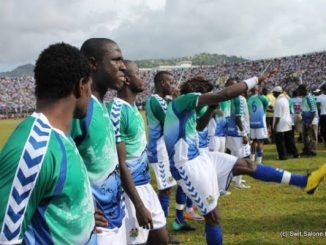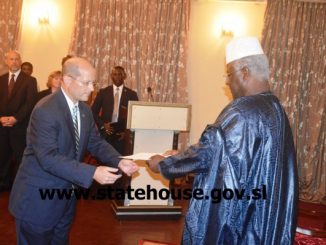SIERRA LEONE: ‘Civil society plays a crucial role in ensuring free and fair elections’
 CIVICUS speaks about Sierra Leone’s 24 June general election with John Caulker, founder and executive director of Fambul Tok.
CIVICUS speaks about Sierra Leone’s 24 June general election with John Caulker, founder and executive director of Fambul Tok.
Founded in 2007, Fambul Tok (‘Family Talk’ in Krio language) is a civil society organisation (CSO) that promotes peace, restorative justice and community building in post-civil war Sierra Leone.
What’s at stake in the 2023 general election?
For many Sierra-Leonean voters, the most pressing concerns revolve around the economy. In his first term in office, President Julius Maada Bio of the Sierra Leone People’s Party, who has just won re-election, allocated 21 per cent of the government budget to support education, positioning himself as a champion of human capital investment. In his second presidential campaign, Bio expressed a commitment to overhaul Sierra Leone’s agricultural sector, believing it will lead to an economic turnaround.
Bio’s supporters believe that the global economic crisis is the main reason for the current financial predicament in Sierra Leone. But Sierra Leone’s economic instability started a lot earlier, with the outbreak of Ebola in 2014, and subsequently deteriorated further with the decline in iron ore mine prices on the global market, the COVID-19 pandemic and the war between Russia and Ukraine. Inflation is in double digits, its highest level in almost two decades.
The main opposition party, All People Congress, nominated the same candidate, Samura Kamara, who previously lost the presidential election in 2018. Kamara, who is an economist, pledged to revive Sierra Leone’s struggling economy and promote national unity.
Both President Bio and Samura Kamara have significant support throughout Sierra Leone, while other candidates hoped that public dissatisfaction with the economy would turn votes against the two major parties.
In addition to selecting a president, voters also elected new lawmakers, mayors and councillors.
What changes have been introduced to the electoral law?
As a result of a 2022 electoral reform, Sierra Leone now uses a proportional system for allocating parliamentary seats. The president decided to adopt this system to avoid by-elections and increase women’s representation, which can be done through legislative quotas when using party lists. The change was judicially challenged, leading to a landmark Supreme Court ruling that upheld the proportional representation system.
Some people believe that by adopting party lists and using multi-member districts, the proportional system takes away their right to choose representatives directly and hands that power over to political parties. Chernor Maju Bah, the leader of the parliamentary opposition, expressed concerns regarding the limited timeframe for educating the public about the intricacies of the new system and argued that more time was necessary to ensure a smooth transition.
Have fundamental civic and democratic freedoms been respected during the election process?
In recent years Sierra Leone has made progress towards safeguarding and upholding freedoms of expression and association in line with its constitution and international human rights standards. However, the situation has varied over time and challenges have arisen in some instances. For example, ahead of the election the Political Parties Regulation Commission imposed a ban on all street rallies organised by political parties. Many viewed this as an infringement of their right to peaceful assembly. However, political parties were still able to gather peacefully in public spaces such as stadiums, large fields and town halls. The use of social media is also subject to limitations and regulations outlined in the Cyber Security and Cyber Crimes Act of 2021. Some arrests have been made for violations of this law.
Sierra Leone has also made significant steps to improve its electoral processes and ensure a transparent, democratic and inclusive political system. Civil society plays a crucial role in ensuring free and fair elections by promoting voter education, monitoring the electoral process and advocating for electoral reforms. Both the government and civil society have made considerable investments to ensure that citizens are well-informed about their rights, the electoral process and the importance of participating in elections, thereby creating a more knowledgeable and engaged electorate.
Sierra Leone has also welcomed international election observers from various organisations and institutions, who provided an impartial assessment and promoted transparency. Moreover, political parties have collectively agreed to abide by a Code of Conduct setting out guidelines for ethical campaigning and peaceful behaviour during elections, encouraging parties to uphold democratic principles and discouraging any form of violence or intimidation.
How has civil society, including Fambul Tok, engaged in the election process?
CSOs have been vigilant and expressed concern over increasing ethnic-based campaigns, hate speech and unrest. These are viewed by civil society as early warning signs of conflict and election-related violence.
Although Sierra Leone has made progress in holding generally peaceful and credible elections, there have been isolated incidents of violence during this election period, including clashes between supporters of different political parties and between opposition supporters and the police, and instances of property destruction such as arson. The opposition also called for public demonstrations following the resignation of the electoral commissioner.
As a peacebuilding organisation, Fambul Tok is focused on promoting nonviolence and voter education through our community structures and is advocating for a culture of political tolerance. Fambul Tok facilitates stakeholders’ meetings to promote peace and national cohesion and avoid malice and violence despite political differences. This has promoted peaceful and inclusive political dialogue, raised awareness about electoral misconduct and ensured that appropriate measures are in place to prevent and address electoral violence, intimidation and any other actions that undermine the integrity of the process.
What international support is Sierra Leone’s civil society receiving, and what other forms of support would you need?
International support plays a crucial role in assisting Sierra Leone’s civil society in both the pre-election and post-election phases. Even though funding support for civil society has diminished during these elections, CSOs continue to collaborate with international institutions to uphold the values and principles of democracy.
International organisations, in partnership with the CSO National Elections Watch, have provided capacity-building training and financial resources to strengthen the skills and knowledge of local CSOs in election monitoring, advocacy, voter education and human rights promotion. This support enhances the effectiveness of civil society in promoting free and fair elections and safeguarding human rights. However, there is also a need for technical resources such as communication tools, data analysis software and logistical support to further enhance the capabilities of civil society.
In 2018 there was post-election violence throughout society. The international community should support CSOs to engage in post-election peace and cohesion campaigns. This involves encouraging communities to accept the outcome of the electoral process and respect the rights of individuals. Diplomatic missions and human rights organisations should remain engaged in the process and keep advocating for a conducive environment for free and fair elections. They can do this by applying diplomatic pressure, issuing public statements and engaging with national authorities to address concerns related to civic space, human rights and electoral integrity.
It is crucial that international support is tailored to the specific needs and priorities of Sierra Leone’s civil society, in close consultation and collaboration with local groups. This approach ensures that support is context-specific, sustainable and responsive to challenges on the ground.
Civic space in Sierra Leone is rated ‘obstructed’ by the CIVICUS Monitor.



